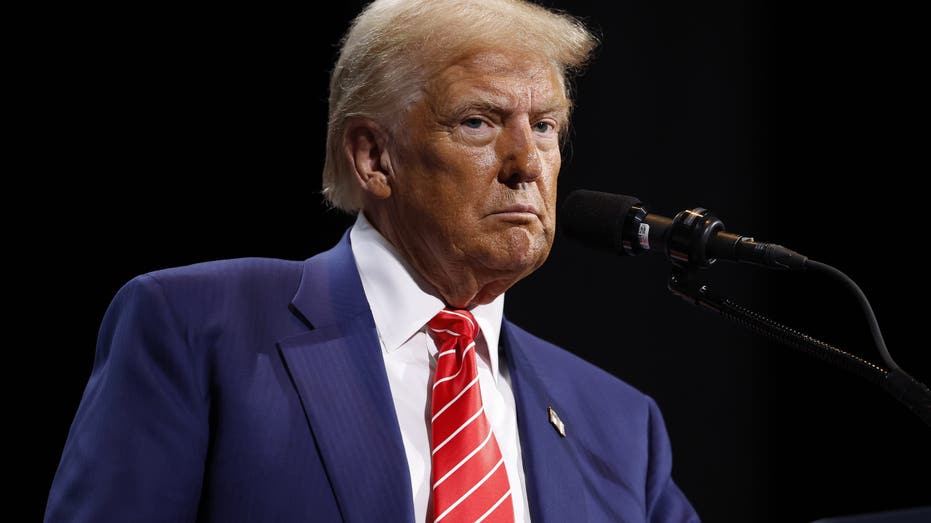New York judge sets Trump sentencing days before inauguration
President-elect Trump's bid to toss his conviction in his New York criminal hush money case was denied on Friday.

President-elect Trump's bid to toss his conviction in his New York criminal hush money case was denied on Friday.
New York Judge Juan Merchan rejected Trump's request to vacate the verdict in the case based on the Supreme Court's presidential immunity decision.
Sentencing is set for January 10 at 9:30 a.m, with the president-elect having the option to appear in person or virtually. But Merchan said he will not sentence the president-elect to prison.
Merchan wrote in his decision that he is not likely to "impose any sentence of incarceration," but rather a sentence of an "unconditional discharge," which means there would be no punishment imposed.
Trump will be sworn in as the 47th President of the United States on January 20.
TRUMP CLAIMS DEMS MAY TRY TO IMPEDE CONFIRMATION HEARINGS FOR HIS NOMINEES
Merchan noted that he is still reviewing the other motions filed by Trump to dismiss the case.
He also rejected the DA’s suggestion that he preserve the verdict, but end proceedings as it would deny Trump’s right to a path to appeal.
"Today’s order by the deeply conflicted, Acting Justice Merchan in the Manhattan DA Witch Hunt is a direct violation of the Supreme Court’s Immunity decision and other longstanding jurisprudence," Trump spokesman and incoming White House Communications Director Steven Cheung told Fox News Digital. "This lawless case should have never been brought and the Constitution demands that it be immediately dismissed. President Trump must be allowed to continue the Presidential Transition process and to execute the vital duties of the presidency, unobstructed by the remains of this or any remnants of the Witch Hunts."
Cheung added: "There should be no sentencing, and President Trump will continue fighting against these hoaxes until they are all dead."
Last month, Merchan also denied Trump attorneys' request to dismiss charges on the basis of presidential immunity.
The ruling comes after President-elect Trump and his team in July requested Merchan overturn his guilty verdict in New York v. Trump, citing the U.S. Supreme Court's ruling that presidents have immunity for official acts.
US APPEALS COURT UPHOLDS TRUMP VERDICT IN E. JEAN CARROLL DEFAMATION CASE
Merchan ruled that the evidence presented in the trial was related "entirely to unofficial conduct and thus, receive no immunity protections."
Trump pleaded not guilty to 34 counts of falsifying business records in the first degree stemming from the yearslong investigation related to alleged hush money payments run by the Manhattan District Attorney’s Office. Former Manhattan District Attorney Cyrus Vance initiated the investigation, and Bragg prosecuted Trump.
After an unprecedented six-week trial in New York City, a jury found the president guilty on all counts.
The U.S. Supreme Court ruled that a former president has substantial immunity for official acts committed while in office.
In the formal motion in July, Trump attorney Todd Blanche pointed to the Supreme Court’s immunity decision, and argued that certain evidence of "official acts" should not have been admitted during the trial.
Trump attorneys, last month, officially requested to "immediately" dismiss charges against the president-elect in New York v. Trump, declaring the "failed lawfare" case "should never have been brought."
TRUMP REQUESTS NY JUDGE OVERTURN GUILTY VERDICT, INDICTMENT AFTER SCOTUS IMMUNITY RULING
Trump attorneys said the case "would never have been brought were it not for President Trump’s political views, the transformative national movement established under his leadership, and the political threat that he poses to entrenched, corrupt politicians in Washington, D.C. and beyond."
Trump lawyers said that "wrongly continuing proceedings in this failed lawfare case disrupts President Trump’s transition efforts and his preparations to wield the full Article II executive power authorized by the Constitution pursuant to the overwhelming national mandate granted to him by the American people on November 5, 2024."
Bragg, in November, requested to Judge Juan Merchan that the case be stayed until the end of Trump’s second term, but Trump attorneys noted that the Office of Legal Counsel in the Justice Department concluded that "the categorical prohibition on the federal indictment of a sitting president…even if the case were held in abeyance…applies to this situation."
They added that Bragg's "ridiculous suggestion that they could simply resume proceedings after President Trump leaves Office, more than a decade after they commenced their investigation in 2018, is not an option."



